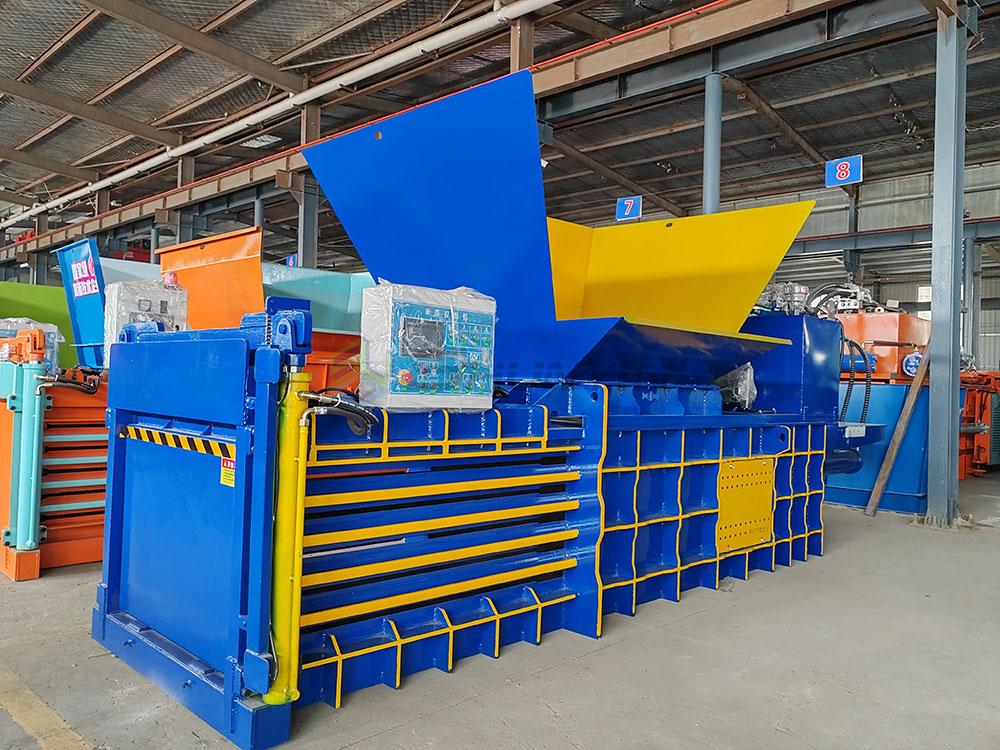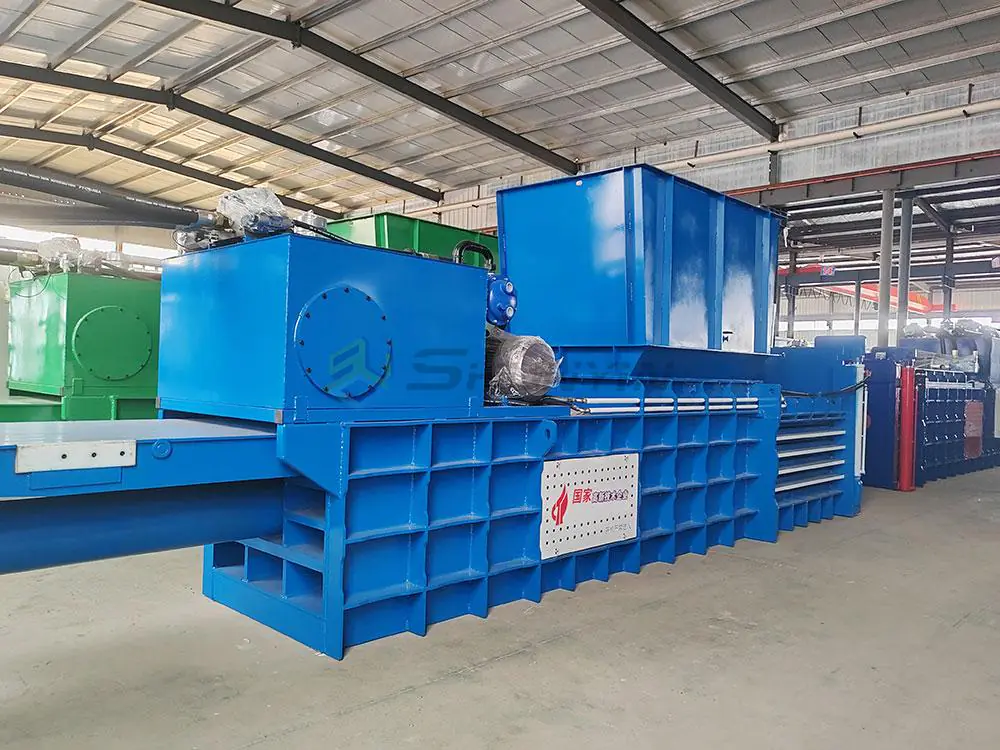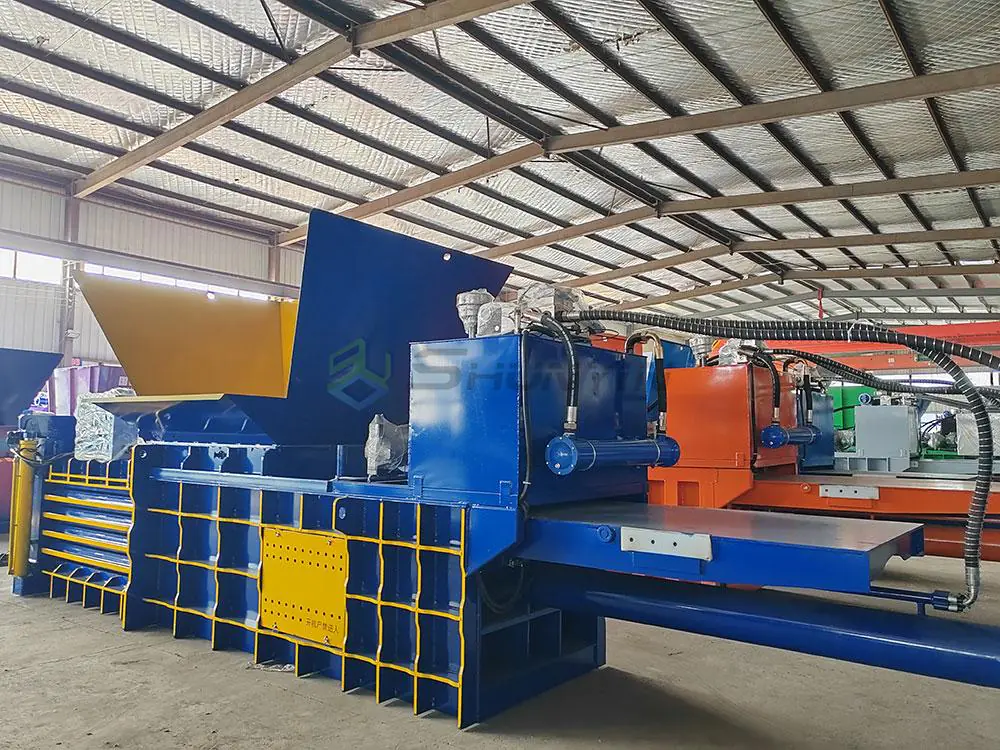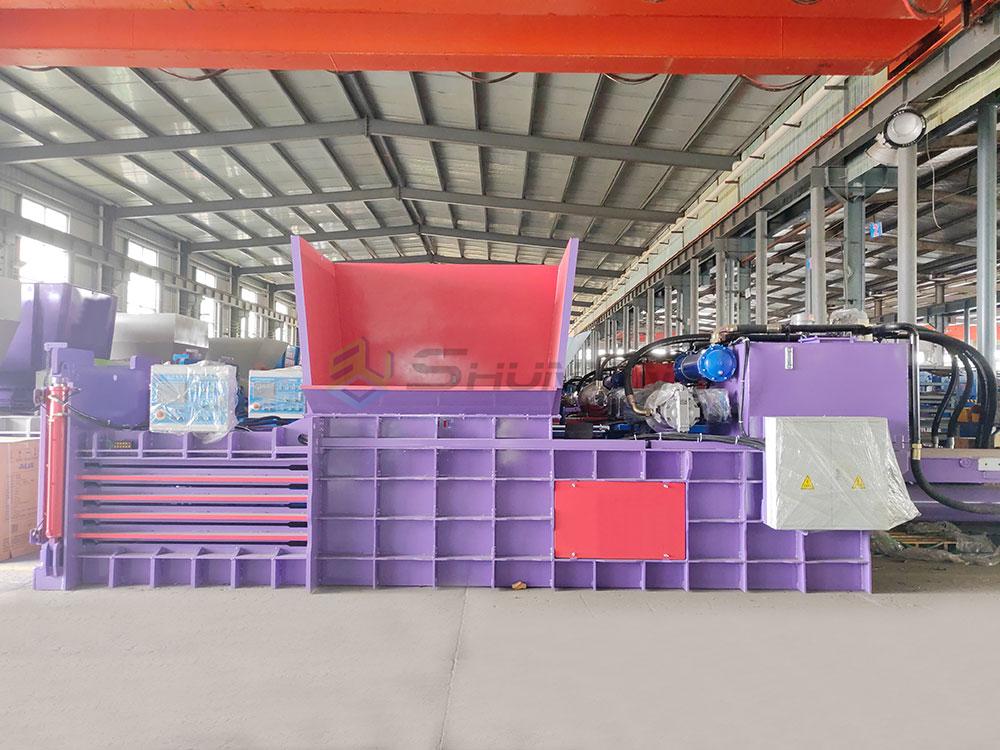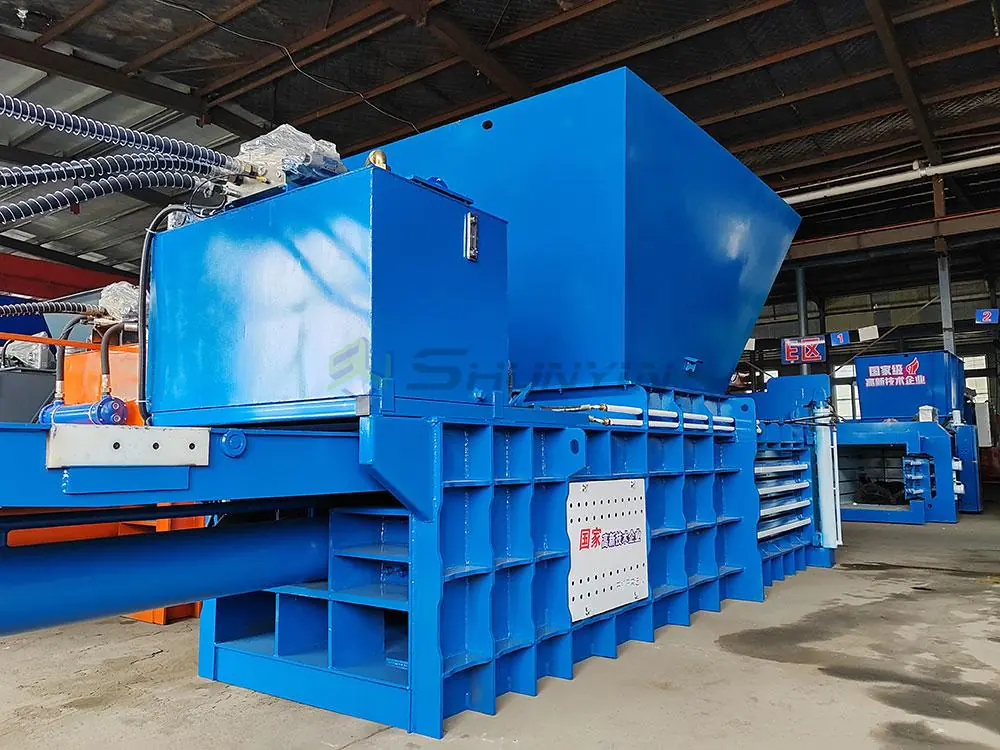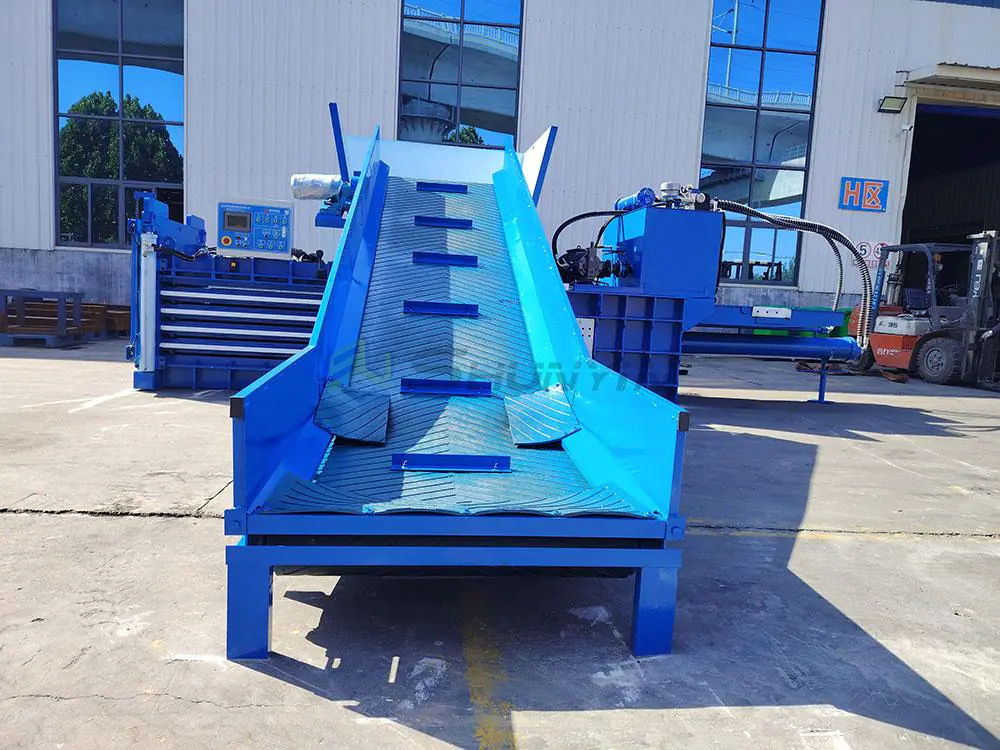
Finding the right supplier for horizontal hydraulic balers can be overwhelming. Many businesses struggle to identify reliable partners that offer quality and value.
The best horizontal hydraulic baler supplier depends on factors like pricing, quality, and customer needs. Leading suppliers include Shunyin Machinery1, Harris Equipment, Balemaster, Baler Solutions, and PTR Baler and Compactor, known for their high-quality products, custom solutions, and strong industry reputations.
Imagine partnering with a supplier that not only provides top-notch balers but also supports your business growth with outstanding service. Let’s explore what makes a supplier the best in the industry.
What is the average price of a baler?
Understanding the average price of a baler is crucial for budgeting and making informed purchasing decisions.
The average price of a horizontal hydraulic baler ranges between $25,000 and $60,000, depending on the machine’s capacity, features, and customization options.

Factors Influencing Baler Pricing
Several elements determine the cost of a horizontal hydraulic baler:
- Capacity: Higher capacity balers capable of handling more waste typically cost more.
- Customization: Tailored features to meet specific operational needs can increase the price.
- Brand Reputation: Established brands with a history of reliability may charge premium prices.
- Additional Features: Automation, energy efficiency, and advanced safety features can add to the overall cost.
| Factor | Impact on Price |
|---|---|
| Capacity | Higher capacity leads to higher prices |
| Customization | More customization options increase cost |
| Brand Reputation | Reputable brands may command premium prices |
| Additional Features | Advanced features can raise the overall cost |
Cost-Benefit Analysis
Investing in a higher-priced baler from a reputable supplier can offer long-term benefits such as durability, lower maintenance costs, and better efficiency. Conversely, opting for cheaper models might save money upfront but could result in higher operational costs over time due to frequent repairs and lower performance.
Example Scenario
A manufacturing company invested in a mid-range baler costing $40,000. Over five years, they saved $15,000 in maintenance and operational efficiencies compared to a lower-priced alternative. This demonstrates the value of considering total cost of ownership rather than just the initial price.
What is the price of automatic baler?
Automatic balers offer enhanced efficiency and reduced labor costs, making them a popular choice for large-scale operations.
The price of an automatic horizontal hydraulic baler typically ranges from $35,000 to $80,000, influenced by automation levels, capacity, and additional features.

Features of Automatic Balers
Automatic balers are designed to streamline the baling process with minimal human intervention. Key features include:
- Automated Loading: Reduces manual handling and speeds up the baling process.
- Automatic Tying: Ensures consistent bale packaging without the need for manual tying.
- Integrated Control Systems: Offer easy monitoring and adjustments for optimal performance.
- Safety Mechanisms: Advanced safety features to protect operators and machinery.
Benefits of Automatic Balers
Investing in an automatic baler can provide significant advantages:
- Increased Efficiency: Higher baling speeds and reduced downtime.
- Labor Savings: Minimizes the need for manual labor, lowering operational costs.
- Consistency: Produces uniform bales, enhancing handling and transportation efficiency.
- Scalability: Easily accommodates increased waste volumes as your business grows.
Comparative Analysis
| Feature | Manual Baler | Automatic Baler |
|---|---|---|
| Labor Requirement | High | Low |
| Baling Speed | Slower | Faster |
| Bale Consistency | Variable | Consistent |
| Initial Investment | Lower | Higher |
| Long-term Operational Costs | Higher due to labor | Lower due to automation |
Return on Investment
While automatic balers have a higher initial cost, the return on investment is achieved through labor savings, increased efficiency, and reduced operational costs. Businesses can expect to recoup their investment within 2-3 years, depending on usage and operational scale.
Success Story
A large recycling facility upgraded to an automatic baler priced at $70,000. Within three years, they saved over $100,000 in labor costs and increased their baling capacity by 50%, highlighting the financial and operational benefits of automatic balers.
How many types of balers are there?
Understanding the different types of balers helps in selecting the right machine for your specific waste management needs.
There are primarily three types of balers: horizontal hydraulic balers, vertical balers, and pneumatic balers. Each type has distinct features and is suited for different applications and waste volumes.

Types of Balers
-
Horizontal Hydraulic Balers:
- Design: Operate horizontally with hydraulic systems.
- Capacity: High capacity, suitable for large volumes of waste.
- Applications: Ideal for industrial settings and large-scale waste management operations.
- Features: Often equipped with automation and advanced control systems.
-
Vertical Balers:
- Design: Operate vertically, taking up less floor space.
- Capacity: Lower capacity compared to horizontal balers.
- Applications: Suitable for small to medium-sized businesses with limited space.
- Features: Typically manual or semi-automatic, with simpler controls.
-
Pneumatic Balers:
- Design: Use air pressure to compress waste materials.
- Capacity: Varies, can handle both small and large volumes depending on the model.
- Applications: Versatile, used in various industries including recycling and manufacturing.
- Features: Offer flexibility in handling different types of waste, including mixed materials.
Comparative Overview
| Type | Capacity | Space Requirements | Automation Level | Suitable For |
|---|---|---|---|---|
| Horizontal Hydraulic | High | Large | High | Industrial and large-scale operations |
| Vertical | Low to Medium | Compact | Low to Medium | Small to medium-sized businesses |
| Pneumatic | Variable | Variable | Variable | Versatile applications across industries |
Choosing the Right Type
Selecting the appropriate type of baler depends on several factors:
- Waste Volume: High volumes necessitate horizontal hydraulic balers.
- Space Availability: Limited spaces may require vertical or pneumatic balers.
- Budget: Consider both initial costs and long-term operational expenses.
- Material Type: Some balers are better suited for specific materials, such as plastics or metals.
Practical Example
A medium-sized manufacturing plant with limited floor space opted for a vertical baler due to its compact design and adequate capacity for their waste volume. Meanwhile, a large recycling center chose horizontal hydraulic balers to manage their high-volume waste efficiently.
What is an industrial baler?
Industrial balers are heavy-duty machines designed to handle large volumes of waste with maximum efficiency and durability.
An industrial baler is a robust, high-capacity machine used in large-scale waste management operations to compress materials into dense bales, enhancing storage, transportation, and recycling processes.

Key Characteristics of Industrial Balers
- High Compression Force: Capable of producing dense bales that reduce waste volume significantly.
- Durable Construction: Built with heavy-duty materials to withstand continuous operation in demanding environments.
- Advanced Automation: Features like automatic loading, tying, and bale ejection for streamlined operations.
- Versatility: Suitable for a wide range of materials, including plastics, metals, cardboard, and more.
Benefits of Industrial Balers
Implementing industrial balers in your waste management system offers several advantages:
- Enhanced Efficiency: Automates the baling process, allowing for faster and more consistent waste handling.
- Cost Savings: Reduces labor costs and transportation expenses by minimizing waste volume and the number of trips needed.
- Space Optimization: Maximizes storage space by producing compact bales, freeing up valuable facility space.
- Environmental Impact: Supports recycling initiatives and reduces the environmental footprint by facilitating efficient waste management.
Implementation Strategy
Integrating an industrial baler into your operations involves:
- Assessment: Evaluate your waste volume, material types, and operational requirements.
- Selection: Choose a baler that matches your capacity needs and material handling capabilities.
- Installation: Ensure proper setup and training for your staff to operate the baler efficiently.
- Maintenance: Implement a regular maintenance schedule to keep the baler running smoothly and extend its lifespan.
Case Study
A large logistics company implemented industrial balers from a leading Chinese supplier. This integration resulted in a 65% reduction in waste handling time and a 40% decrease in transportation costs. The balers’ robust design and automation features allowed the company to handle increased waste volumes without additional labor costs, significantly boosting their operational efficiency.
| Feature | Benefit |
|---|---|
| High Compression Force | Significantly reduces waste volume |
| Durable Construction | Ensures long-term reliability and minimal downtime |
| Advanced Automation | Streamlines operations and reduces labor requirements |
| Versatility | Handles various types of waste materials seamlessly |
Selecting the Right Industrial Baler Supplier
When choosing an industrial baler supplier, consider the following:
- Reputation: Look for suppliers with positive reviews and a history of reliable service.
- Customization Options: Ensure the supplier can tailor balers to meet your specific needs.
- After-Sales Support: Choose a supplier that offers robust customer support and maintenance services.
- Quality Assurance: Verify that the supplier adheres to industry standards and provides high-quality machinery.
Success Story
A global manufacturing firm partnered with a top Chinese baler supplier known for its quality and customization capabilities. The supplier provided industrial balers that were tailored to the firm’s specific waste types and volumes. Post-installation, the company reported a 50% improvement in waste processing efficiency and enhanced their sustainability metrics, reinforcing their commitment to environmental responsibility.
Conclusion
Identifying the best horizontal hydraulic baler supplier involves evaluating pricing, automation options, baler types, and the robustness of industrial balers. By choosing a reputable supplier that offers quality, customization, and reliable support, businesses can optimize their waste management processes and achieve their operational goals effectively.
-
Jining Shunyin Machinery Co.,Ltd Baling Machine Manufacturer ↩


